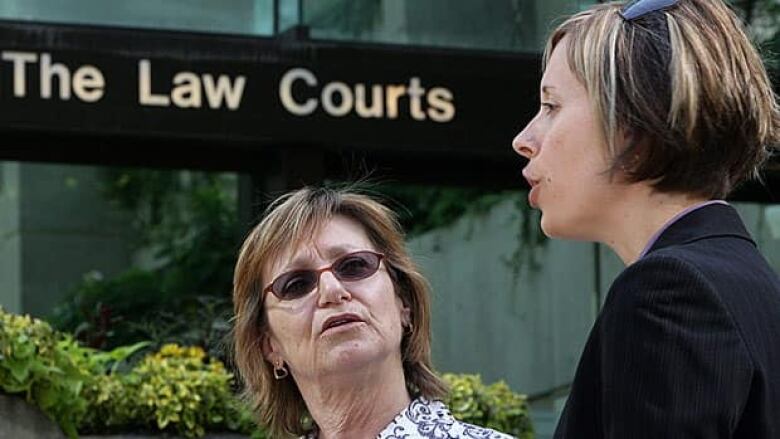Supreme Court to rule on sex-trade workers' right to hearing

The Supreme Court of Canada is set to rule whether an advocacy group, or a person not directly related to a case, can be givenstanding in a constitutional challenge.
The group in this case is a non-profit organization composed of women and transgender women in the sex trade in downtown Vancouver.
Katrina Pacey, a lawyer for the Downtown Eastside Sexual Workers Against Violence, says it would be incredibly important, and likely precedent setting,if the Supreme Court of Canada gave public interest standing to the sex workers' group.
"This would provide a real opportunity for marginalized people, people with mental health issues, people with HIV, prisoners, refugees, children to form a collective organization whereby they then have the support and capacity to bring these cases forward, as a community," Pacey said.
The constitutional challenge launched by sex workers is aimed at a broad range of laws against prostitution, including keeping a bawdy house, living off the avails of prostitution and communicating in a public place for the purposes of prostitution.
Five years ago, the sex workers' group began an action in B.C. Supreme Court claiming these laws infringed several of their members' Charter rights.
A former sex trade worker, Sheryl Kiselbach, then asked to be included in the case.Kiselbach worked for approximately 30 years as an exotic dancer, performing live sex shows, working in massage parlours, conducting street level sex work and working independently in indoor sex work.
The federal government was able to have the B.C. court claim dismissed, arguing that neither the sex workers' group nor Kiselbach had public or even private interest standing in the case.The argument the government used is that Kiselbach is no longer a sex trade worker and therefore cant be discriminated against by prostitution laws. It also argued that the sex workers' group is not a person whose rights can be infringed.
However, the B.C. Court of Appeals reversed that decision.The federal government then appealed to the Supreme Court of Canada.
In court documents, the government argues that there has been good reason to limit granting public interest standing to groups. It says it avoids "opening the floodgates to unnecessary litigation."The government continues that there is a danger of using "scarce judicial resources by applying them to real, rather than hypothetical, disputes."It also says, "Cases will be inadequately presented by parties who have no real interest in the outcome."
Pacey says constitutional challenges are difficult and demanding for marginalized groups such as sex trade workers who risk being harassed and exposed to publicity as legal proceedings drag on.
"So for these women to be told," says Pacey, "they can't litigate this case, you can imagine the impact on them, when they think, well we've formed a non-profit, we've done everything we can to rally all the personal resources that we have which is very limited given that they're all struggling with addiction and mental health issues, and they feel excited and empowered in this context. And then they face the next five years with the federal government that is trying to shut the case down."
If the sex trade workers and Kiselbach are granted standing by the Supreme Court of Canada Friday, they go back to square one, to B.C. Supreme Court once again to begin arguing the merits of their case.
In a separate case in March, the Ontario Court of Appeal upheld a lower court ruling that struck down three provisions of the Criminal Code relating to prostitution, including the prohibitionon common bawdy houses and living off the avails of prostitution. Sex-trade workers hailed the decision as a recognition of their rights and said it would enhance their safety.
The federal government served notice in April that it would seek leave to appeal that decision to the Supreme Court. The court has not yet indicated whether it will hear the appeal.












_(720p).jpg)


 OFFICIAL HD MUSIC VIDEO.jpg)
.jpg)



























































































